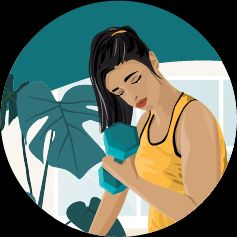Your first job is a big enough deal without stressing about your ulcerative colitis. However, there are ways to make the transition as smooth as possible.
Landing your first big job is exciting. But if you have ulcerative colitis (UC), you might feel anxious about managing your symptoms while managing work tasks as well.
UC often shows up right when you’re beginning to build a career, making flare-ups and UC-related fatigue even more challenging. Whether you’re on your feet all day, working shifts, or logging in from a desk (either at home or in an office), symptoms like urgency, pain, and discomfort can affect both your performance and confidence.
A recent meta-analysis study found that inflammatory bowel disease, including UC, affected people’s regular participation in their daily work. In particular, work absenteeism was a problem.
If UC forces you to miss too much work, you might worry that you’ll lose your job.
Here are seven tips to ease your transition into the job market and reduce the effects of UC on your career.
Starting on treatment as soon as possible after your diagnosis will ensure the best possible outcome, both for your condition and your career.
Medications like the aminosalicylates (5-ASAs), corticosteroids, and immunomodulators suppress inflammation and give your colon time to heal. Which of these treatments your doctor prescribes depends on the severity of your disease.
The ultimate goal of treating UC is remission. Once your condition is under control, you can worry less about symptoms and turn your focus to work and advancing your career.
Under the Americans with Disabilities Act (ADA), if you’re qualified for your job and can handle its basic responsibilities, you have the right to ask for accommodations to make your role easier.
To explore what options may be best for you, talk with a human resources manager at work. The conversation will likely involve disclosing that you have UC, but being upfront about what’s going on can open the door to meaningful support.
Read on to get a few ideas for UC accommodations.
One of the easiest accommodations your company can make is to give you a desk close to a restroom. Even better if you can work near a single restroom for added privacy. Being conveniently situated near one can provide comfort and peace of mind, allowing you to focus on your work without stressing about getting there in an urgent situation.
If you’ve lived with UC for any amount of time, you may know which times of day might be difficult for you to be in the office.
Maybe mornings are tough because you tend to need extra time in the restroom, or perhaps midday fatigue takes your head out of the game. Whatever time of day is most difficult for you, a flexible schedule can help.
Ask human resources about starting later in the day, working remotely in the mornings or afternoon, or making up time in the evening. Many office jobs are hybrid now, and having a couple of days working from home can be beneficial too.
It’s also worth asking about additional time off, whether paid or unpaid. Having a cushion here can be useful for managing medical appointments or simply needing an extra day to rest.
You are under no obligation to divulge your condition to anyone at work, and it’s perfectly fine if you want to keep your diagnosis private. That said, it can be helpful to have one or two trusted colleagues who are in the loop. They may be able to offer quiet support, step in if you need to duck out of a meeting or leave early, or simply help normalize your need to take care of yourself during the day.
If you only get a limited number of breaks each day, ask for extra time. You may need to slip off to the bathroom or take a quick nap, and you want to make sure someone is there to cover for you.
Breaks are also helpful if you eat several small meals each day or need a few minutes to take your medication.
Fatigue and joint pain can make it tough to walk long distances or navigate stairs. If you drive to work, see if your employer can give you access to a parking spot close to your entrance, if UC doesn’t qualify you for a handicapped tag. If you take public transportation to work, find out the best exit or stop for getting to your place of work.
Small changes to how you get to and from work — including how you enter the building — can help conserve energy and reduce stress at the start and end of your day.
Having ulcerative colitis (UC) can be difficult in a new career. Make the transition easier by asking your human resources department for the accommodations you need to get through the day.
Once those accommodations are in place, they’re not set in stone. Modify them as needed for the optimal work environment. Remember, the more comfortable you are, the better you’ll be able to perform your job.





